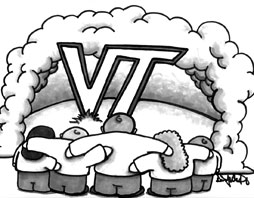By Sharon Murra-Kapon/south news editor
Terrorism has many faces and manifestations, but the result is always grief and loss.
For many, terrorism involves only a violent act from foreign countries to harm our nation; however, its meaning goes further.
The Columbia Electronic Encyclopedia, Sixth Edition, describes terrorism as the threat or use of violence, often against the civilian population, to achieve political or social ends, to intimidate opponents or to publicize grievances.
In a few words, anyone who has fed rage, resentment, hatred and like feelings, whether a citizen, resident or a foreigner, can perform a terrorist act.
Shootings and violence in schools are a form of terrorism. Fox News Online reported only two weeks ago that an Arizona middle school student was charged with terrorism for planning to hold a class hostage.
The 14-year-old had confronted a girl with a knife prior to his arrest.
The Mesa police department said the boy was planning a Columbine-like scenario. A massacre was avoided because the girl whom he confronted called the police instead of remaining silent, the article said.
Like cases seem to beg the question: What is the reason for their actions?
“ Except for those involved in the Beslan, Russia, school massacre, the perpetrators were all members of the victim’s community in one way or another,” Eric Shoemaker, retired law enforcement executive, said in Terrorism in American Schools: The First of All Fears (www.riskinstitute.org).
Shoemaker said a greater likelihood exists that the threat comes from individuals who have a series of emotional problems, plus access to firearms. Another high threat rests with lone, disturbed individuals.
The American Psychological Association said on its Web site that emotional problems lead to violence, which is a learned behavior. Although not easy, the behavior can be changed.
“ Since there is no single cause of violence, there is not one simple solution. The best you can do is learn to recognize the warning signs of violence and get help when you see them in your friends or yourself,” the Web site said.
Some signs of violence listed on the Web site are regular threats against others, gang membership (or strong desire to be in a gang) or serious drug or alcohol use. Signs also include access to or fascination with weapons, trouble controlling anger, withdrawal from friends, problems with discipline or disrespect of authority.
“ From 1990 to 1995, the United States had the highest rate of firearm-related deaths among youths in the industrialized world. The rate for children below age 15 was five times higher than that of 25 other countries combined,” a surgeon general report on youth violence said.
Terrorism might not be avoided at all times, but security measures could reduce the number of attempts.
Tarrant County College police, among those at many other educational institutions, are trained in basic Homeland Security terrorism.
For example, if a terrorist act were to happen, the TCC police department will immediately carry out a notification procedure.
Frank Buchanan, TCC chief of police, said the police would use the various public communication systems available on each campus, including the public address system on SE, individual bull horns located in buildings on some campuses, speakers from police vehicles, telephone calls and e-mail notification.
In addition, Buchanan said the media will be quickly contacted to warn people who are not on campus to stay away until further notice.
“ My job as a chief is to try to make as safe and secure an environment as possible for effective learning and education,” he said.
In addition, he said that TCC is committed to and always looking into new training in the latest technology.
“ We will continue with that mission,” he said.
Buchanan also said that although the police department works day by day to provide the safest possible environment, the police need for students, faculty and staff to keep their eyes opened and report any suspicious activity or behavior.
Anyone who suspects a potential terrorist activity should call 866-SPEAK-UP. The call is free and anonymous and will be directed to the local authorities.
A memo posted on TCC’s Web site by Chancellor Leonardo de la Garza following the Virginia Tech shooting said that any suspicious activity should be reported by calling 8911 from any campus phone.






















